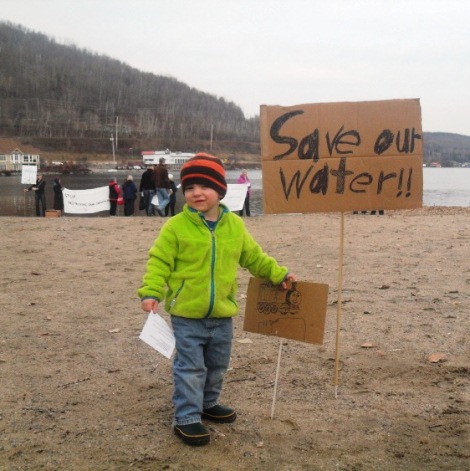 A National Day of Action was held on Saturday at Olmstead Beach, with residents from North Bay and surrounding areas supporting the environment with over a 132 other simultaneous events happening across the country.
A National Day of Action was held on Saturday at Olmstead Beach, with residents from North Bay and surrounding areas supporting the environment with over a 132 other simultaneous events happening across the country.
The demonstration took place on the beautiful shores of Trout Lake, known for its deep and clean waters that provide the area's municipal water supply.
A warm mid-November day gave over a hundred participants a great afternoon to make their concerns known to the community; that the environment is a necessity in order to maintain a healthy and happy society.
The main issues at this event focused on fresh water protection and the necessity to keep volatile chemicals and pollutants out of the area's waterways.
Clean drinking water, a necessity for life, can all too easily be overlooked in the consequences of industrialization, creating pollution that comes to back to harm the very people that the technology and resources were designed to benefit.
Environmentalists are currently concerned about the safety and viability of the Trans Canada Energy East Pipeline Project, scheduled to push 1.1 billion barrels of bitumen and dilbit through a network of pipe's that were originally designed for natural gas and built over 35 years ago.
Of course, other alternatives, such as moving oil by truck or train, have equally important safety concerns but many of the protesters feel that too little is being done to ensure safety or establish a safe way of controlling and cleaning up accidents when they occur, which seems more likely than not.
With environmentalism being shadowed with current media events such as the Greenpeace in Russia, today's event seemed extremely positive, peaceful and not concerned with establish monetary gains or finds.
Yan Roberts, an organizer for the community event, was happy to announce that the environmentalists were seeing some progress just this week, with the Ontario Government stepping in to have their own talks regarding concerns between communities and industry, with the impacts on the environment and possibly, job creation in and around Ontario communities.
“So that gives citizens a great opportunity to have their voices actually heard and then represented in that National Energy Board process,” says Roberts.
Roberts, standing on the shores of Trout Lake, points above his shoulders where, on the escarpment, approximately a kilometre up from the water source, the major pipeline moving the bitumen is located and says that even a minor leak in the aged pipeline could bankrupt the city in trying to clean up and perhaps completely pollute the water supply, making it unfit for consumption and rendering North Bay, a town of 54,000, dry without clean water and ultimately, uninhabitable.
“That is a serious risk and a likely consequence too, of running bitumen through this old pipeline,” says Roberts.
“That's why the community has gathered around,” he adds.
Nonetheless, Roberts says that those in the community were staying positive and hoping that they can accumulate the information and resources from government, municipality and industry to form the necessary structures to create an emergency preparedness plan in the event of a mishap in the area.
“The industry has not come up with a reasonable way to clean this stuff up and as soon as it leaks from the pipelines, it off gases into toxic clouds and heavy bitumen sinks down to the bottom, so a lake like Trout Lake, which is over 250 feet in some cases, they have no course at all to even attempt to clean that up,” says Roberts.
Roberts also points out that in 2010, when the majority of the tar sands project because foreign owned, the decision was made to ship the diluted bitumen through the pipelines instead of the safer syn bit that would have to be refined in Alberta, however, this increases the likelihood of failure for the pipelines as well as increases the impacts of leaks on the Canadian landscape, likely low of the list of concerns of the foreign companies now in control of the resource.
The bitumen is far more toxic and corrosive as well as gritty and abrasive to the pipes, with a texture similar to peanut butter or cement and nearly impossible to clean up with conventional methods, versus the higher quality syn bit.
“It's a cheaper alternative for them,” say Roberts, “and it’s both more likely to leak and be more dangerous when it does.”



